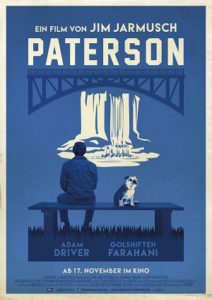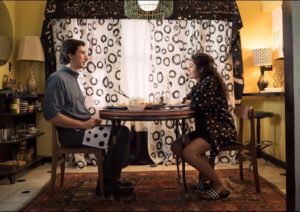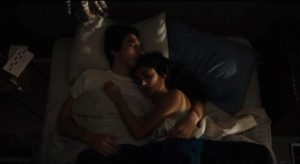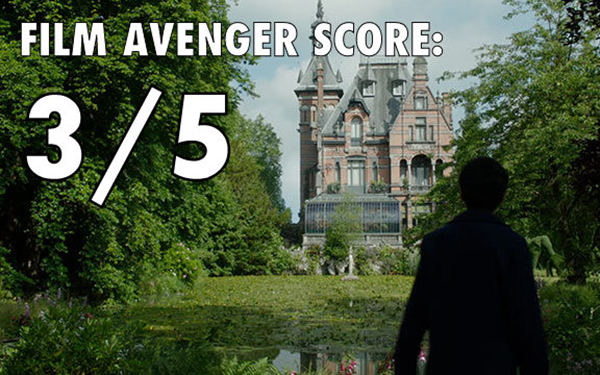 It’s Monday and the early morning sun cast an amber glow to the white undershirt of Paterson (Adam Driver) and the brown skin of his wife (Golshifteh Farahani). Paterson sleepily rolls over and picks his wristwatch off the bedside table. It’s 6:15 am. He caresses his wife, who, half awake, begins to tell him the details of her most recent dream. In the kitchen, over his cup of Cheerios, Paterson examines the label of a matchbox on the kitchen counter. During his walk to work, the beginnings of a poem form a shape in his mind. As he gets ready for his workday as city bus driver, he sits behind the wheel and begins to write down this poem. While he maneuvers the vehicle through the streets of Paterson, New Jersey, the conversations of his passengers, the memories of day, and the lines of his new poem swirl through his mind.
It’s Monday and the early morning sun cast an amber glow to the white undershirt of Paterson (Adam Driver) and the brown skin of his wife (Golshifteh Farahani). Paterson sleepily rolls over and picks his wristwatch off the bedside table. It’s 6:15 am. He caresses his wife, who, half awake, begins to tell him the details of her most recent dream. In the kitchen, over his cup of Cheerios, Paterson examines the label of a matchbox on the kitchen counter. During his walk to work, the beginnings of a poem form a shape in his mind. As he gets ready for his workday as city bus driver, he sits behind the wheel and begins to write down this poem. While he maneuvers the vehicle through the streets of Paterson, New Jersey, the conversations of his passengers, the memories of day, and the lines of his new poem swirl through his mind.
Lunch break finds Paterson in front of a waterfall at the city park. The poem continues to grow in his notebook and he eats a carefully packed meal out of a lunch box. On the inside lid of the lunch box is tapped a photo of his eccentric and beautiful wife. He arrives home later that afternoon, and she shows him the latest black-and-white-patterned art project she’s been working on, or the cupcake recipe she’s preparing for that weekend’s bake sale, or the latest hobby she’s excited to begin. He listens to her enthusiastic ideas, quietly encouraging her while they eat a meal. Then he takes their eager English bulldog Marvin for a walk, cumulating with a stop at the neighbourhood pub. There Paterson drinks his beer, observing while his friends works through their relationships and their future hopes.
 And so the daily routine repeats as Jim Jarmusch’s film follows a week in this man’s life. Certain details are the same – the morning sun and the wristwatch, the walk to work and the pub visit, while other details change – there’s a new photo on his lunchbox, different passengers board his bus. The film is about these details and how Paterson notices them and works them into his imagination. It’s about the settled routine of a peaceful life and the significance of this routine’s variations. It’s also about the people in these routines – the strangers we serve through our jobs, the neighbours we bump into and interact with, and the quirks of those with whom we choose to live our lives. It’s a gentle, warm hearted wonder of a film, carefully crafted to include incidents that work on multiple levels
And so the daily routine repeats as Jim Jarmusch’s film follows a week in this man’s life. Certain details are the same – the morning sun and the wristwatch, the walk to work and the pub visit, while other details change – there’s a new photo on his lunchbox, different passengers board his bus. The film is about these details and how Paterson notices them and works them into his imagination. It’s about the settled routine of a peaceful life and the significance of this routine’s variations. It’s also about the people in these routines – the strangers we serve through our jobs, the neighbours we bump into and interact with, and the quirks of those with whom we choose to live our lives. It’s a gentle, warm hearted wonder of a film, carefully crafted to include incidents that work on multiple levels
For example, on the first morning Paterson’s wife shares a dream in which she gives birth to twins, “one for you and one for me.” Paterson responds and then seems to forget the dream. But does he? On his way to work he greets two identically dressed older gentlemen. Two twin children board his bus and sit next to each other. That evening at the pub, an acquaintance introduces Paterson to his twin brother. Paterson notices each of these details and you begin to wonder with him; did her dream influence his day? Another surreal moment appears later in the week, when the young stars of Moonrise Kingdom (Kara Hayward and Jared Gilman) enter the bus and Paterson listens in to their deep conversation. Are they a random couple or the grown up versions of that movie’s heroes? These touches are to the film as Paterson’s poetry is to his life – they provide richer meaning and significance to its details.
I’ve seen many slow films celebrating the small joys of life. But Paterson stands apart. Perhaps it’s the movie’s humour. It is a genuinely funny film, with many little hidden jokes that build upon each other as the week progresses. It’s also because this movie is so accurate to life, featuring characters I’d recognize anywhere, effortlessly realized by the excellent cast. Yet what I most appreciated was the way the film included both life’s small joys and its small struggles. Nothing earth shattering happens, but the week includes complications and concludes with a moment of deep disappointment that threatens the poet’s creative vision. The film’s ending handles this tension in a way that restores hope, while being honest about the ups and downs of the creative process.
 I watched Paterson in a my local theatre immediately following a screening of Wim Winders 1987 classic, Wings of Desire. Both movies are about noticing and appreciating the details of the human experience. They complement each other beautifully. In Wings of Desire, the angels soar noiselessly over divided Berlin, observing it from above. In Paterson, the poet’s bus grinds through the street of New Jersey while its driver notices the people both inside and outside the bus. Wings of Desire is the more euphoric of the two, fitting for a story about timeless angels. But Jim Jarmuch’s vision is more practical, grounded, and perhaps more realistic. I know it will bear up to repeated viewings and it is certainly one of my favourite movies of 2016.
I watched Paterson in a my local theatre immediately following a screening of Wim Winders 1987 classic, Wings of Desire. Both movies are about noticing and appreciating the details of the human experience. They complement each other beautifully. In Wings of Desire, the angels soar noiselessly over divided Berlin, observing it from above. In Paterson, the poet’s bus grinds through the street of New Jersey while its driver notices the people both inside and outside the bus. Wings of Desire is the more euphoric of the two, fitting for a story about timeless angels. But Jim Jarmuch’s vision is more practical, grounded, and perhaps more realistic. I know it will bear up to repeated viewings and it is certainly one of my favourite movies of 2016.


